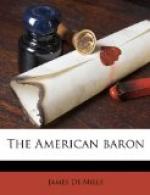“‘You can’t mean it?’ I said.
“‘I do mean it,’ she replied. ‘Ring the bell,’ she added, imperiously.
“I stood looking at her.
“‘Leave the room, then,’ she said.
“‘I must have a satisfactory answer,’ said I.
“‘Very well,’ said she. ‘Here it is.’
“And saying this she took the penknife by the blade, between her thumb and finger, and slung it at me. It struck me on the arm, and buried itself deep in the flesh till it touched the bone. I drew it out, and without another word left the room. As I went out I heard her summoning the maid in a loud, stern voice.
“Well, after that I went to the Continent, and spent about six months. Then I returned.
“On my return I found every thing changed. She had sent off all the servants, and brought there a lot of ruffians whom she was unable to manage, and who threw every thing into confusion. All the gentry talked of her, and avoided the place. My friends greeted me with strange, pitying looks. She had cut down most of the woods, and sold the timber; she had sent off a number of valuable pictures and sold them. This was to get money, for I afterward found out that avarice was one of her strongest vices.
“The sight of all this filled me with indignation, and I at once turned out the whole lot of servants, leaving only two or three maids. I obtained some of the old servants, and reinstated them. All this made my wife quite wild. She came up to me once and began to storm, but I said something to her which shut her up at once.
“One day I came home and found her on the portico, in her riding-habit. She was whipping one of the maids with the butt end of her riding-whip. I rushed up and released the poor creature, whose cries were really heart-rending, when my wife turned on me, like a fury, and struck two blows over my head. One of the scars is on my forehead still. See.”
And Dacres put aside his hair on the top of his head, just over his right eye, and showed a long red mark, which seemed like the scar of a dangerous wound.
“It was an ugly blow,” he continued. “I at once tore the whip from her, and, grasping her hand, led her into the drawing-room. There I confronted her, holding her tight. I dare say I was rather a queer sight, for the blood was rushing down over my face, and dripping from my beard.
“‘Look here, now,’ I said; ’do you know any reason why I shouldn’t lay this whip over your shoulders? The English law allows it. Don’t you feel that you deserve it?’” She shrank down, pale and trembling. She was a coward, evidently, and accessible to physical terror.
“‘If I belonged to your class,’ said I, ’I would do it. But I am of a different order. I am a gentleman. Go. After all, I’m not sorry that you gave me this blow.’




